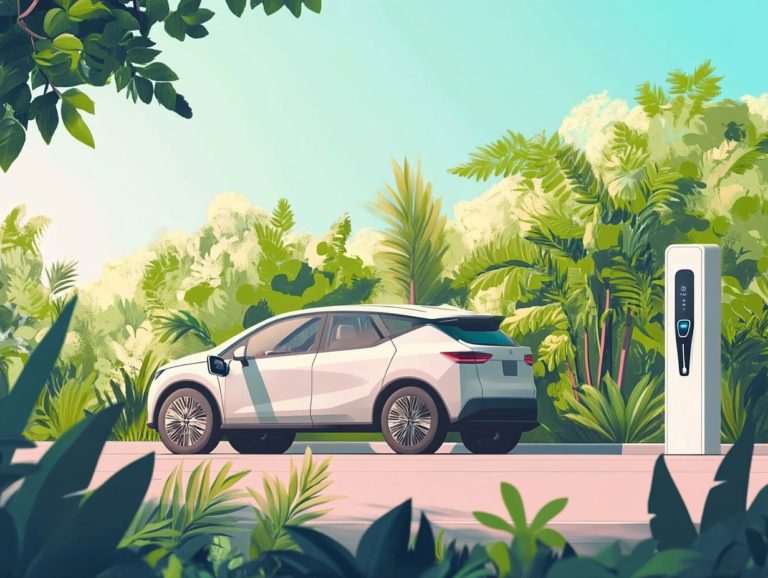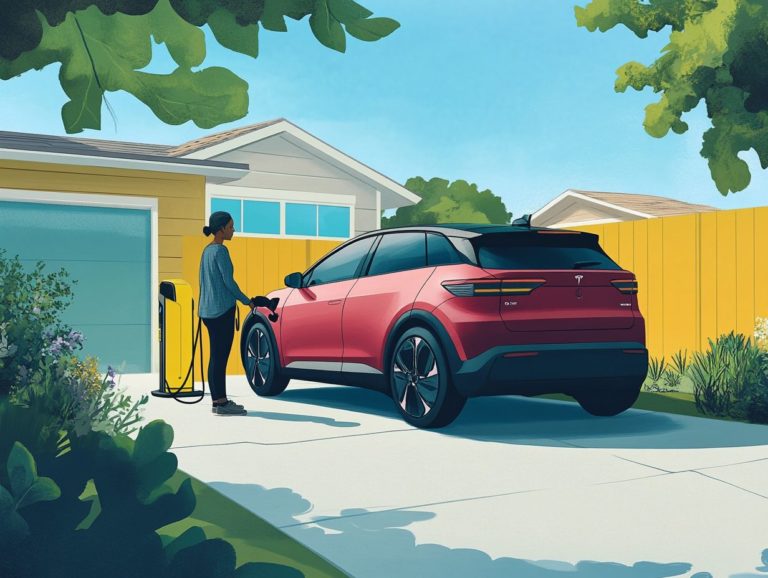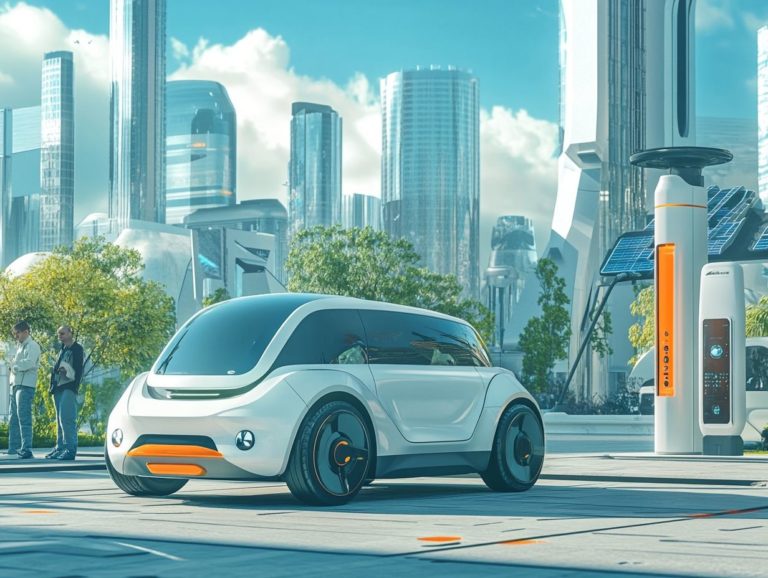Electric Vehicle Financing Options You Should Know
Electric vehicle financing opens the door to a sustainable and budget-friendly way to drive.
As electric vehicles (EVs) rise in popularity, grasping your financing options becomes essential. This article explores the benefits of financing an EV. You’ll learn about potential cost savings and incentives.
You ll find a comparison of leasing versus buying and a discussion on traditional versus alternative financing methods. It also guides you through the application process, getting you ready to enjoy the exciting future of driving.
Contents
- Key Takeaways:
- Benefits of Financing an Electric Vehicle
- Types of Financing Options
- Factors to Consider Before Financing
- How to Apply for Electric Vehicle Financing
- Frequently Asked Questions
- What are the different financing options available for electric vehicles?
- Is it better to buy or lease an electric vehicle?
- What is the average interest rate for electric vehicle financing?
- Are there any government incentives available for electric vehicles?
- Can I finance an electric vehicle if I have bad credit?
- What are the benefits of financing an electric vehicle?
Key Takeaways:

- Leasing an Electric Vehicle can provide cost savings and incentives, but buying allows for ownership and potential tax incentives.
- Alternative financing options, such as loans from credit unions or online lenders, may offer more competitive rates and terms compared to traditional financing through a dealership.
- Before applying for electric vehicle financing, consider your credit score, loan terms, and the availability of charging stations in your area to ensure the best financing option for your needs.
What is Electric Vehicle Financing?
Electric vehicle financing is a specialized avenue crafted just for you, aimed at making it easier to acquire eco-friendly cars like the Tesla Model 3 and Ford Mustang Mach-E. This financing option opens the door to electric vehicle loans that boast attractive terms and lower the yearly cost of borrowing money. For those looking for more information, exploring alternative financing options for cars can enable you to make informed financial choices while supporting the burgeoning market for electric vehicles, aligning perfectly with the latest trends in sustainability and technology within the automotive industry.
In contrast to traditional vehicle financing, which often centers around gas-powered models, electric vehicle financing is tailored specifically for those embracing green technology. As consumer interest in electric vehicles skyrockets thanks to rising environmental awareness and breakthroughs in battery technology financial institutions are stepping up to offer customized loan products designed for you.
Understanding prequalification (checking if you qualify for a loan before you apply) and pre-approved options can help you secure the best terms available. This knowledge can help you secure the best financing options quickly and support the growth of electric vehicle use today!
Benefits of Financing an Electric Vehicle
Financing an electric vehicle opens up a world of benefits for you. You’ll gain access to green auto loans, which often come with favorable terms, and you might also enjoy significant savings through the EV tax credit.
Over time, the reduced cost of ownership becomes apparent, as electric vehicles generally require less maintenance than traditional gasoline cars. This not only makes them a prudent financial choice but also aligns perfectly with your eco-conscious values.
Cost Savings and Incentives
The cost savings associated with financing an electric vehicle are impressive, especially when you take advantage of the EV tax credit. This benefit can significantly reduce the overall cost of ownership, making electric cars a compelling choice for anyone mindful of their vehicle purchase decisions.
On top of the federal tax incentive, many states offer their own rebates and credits that can further lower the price of an electric vehicle. When combined, these financial perks can add up to thousands of dollars in savings.
As an electric vehicle driver, you ll likely enjoy reduced fuel costs; studies show that charging an electric car can be 60-70% cheaper than filling up with gasoline. Plus, with EV maintenance typically being less expensive thanks to electric motors having fewer moving parts you might save around $1,000 each year.
The expanding network of charging stations is also game-changing, enhancing convenience and easing range anxiety. This only solidifies the financial appeal of owning an electric vehicle.
Types of Financing Options

When you explore electric vehicle financing, you’ll find various options. From leasing to low-APR financing, these financing options for electric vehicles can significantly ease acquiring eco-friendly vehicles.
Depending on your financial situation, you can select the financing route that best meets your needs. This makes the journey to sustainable driving more accessible.
Leasing vs. Buying
Choosing between leasing and buying an electric vehicle requires careful consideration of the advantages that leasing offers. These include lower monthly payments and the opportunity to enjoy the latest electric models every few years.
However, you also need to weigh this against the long-term financial benefits of outright ownership. This includes all costs throughout the vehicle’s life, like maintenance and repairs, and your personal financial situation.
As you navigate this decision, it’s crucial to consider all aspects of ownership, including maintenance, insurance, and potential resale value. Leasing tends to appeal to those who want to experience the newest technology without the long-term commitment of purchasing.
Remember, factors like depreciation can greatly affect your ownership costs. New models frequently introduce advancements that can make older vehicles feel outdated.
You ll notice that major car manufacturers are increasingly promoting attractive leasing programs alongside competitive electric vehicle loans. This aims to encourage consumers to make the switch to electric models, shaping your choices and redefining the future of mobility.
Traditional vs. Alternative Financing
Understanding the distinctions between traditional financing and alternative financing options is essential for consumers eager to invest in electric vehicles. Alternative fuel financing often comes with more favorable terms and incentives, particularly when sourced through credit unions and specialized financial institutions that prioritize eco-friendly vehicles.
These alternative financing avenues provide lower interest rates and reduced fees. They frequently include perks like cash rebates or extended repayment plans specifically designed for electric vehicle purchases.
Many credit unions have rolled out tailored programs emphasizing sustainability, making it easier for you to secure loans at competitive rates. Certain financial institutions are stepping up by offering dedicated services for EV buyers, creating a supportive environment for those aiming to reduce their carbon footprint.
This shift in financing options enables you to make environmentally conscious choices while enjoying better financial terms. It’s essential to explore these options now. Making the right financial choice today can lead to significant savings in the long run.
Factors to Consider Before Financing
Before you decide on electric vehicle financing, it’s essential to weigh several key factors. Your credit score plays a pivotal role, shaping the terms and conditions of the loan you’ll receive.
Also, consider the availability of charging stations in your area. This ensures your choice aligns with practical financial decisions and enhances your overall ownership experience.
Credit Score and Loan Terms

A borrower s credit score is crucial in shaping the terms of your loan for electric vehicle financing. With higher credit scores, you can unlock better interest rates and more favorable loan conditions. This can significantly impact your overall financial decisions.
As you explore financing options, it’s important to realize that a strong credit score not only leads to lower monthly payments. This may also open the door to reduced down payments, allowing you to save more money upfront.
Understanding how credit scores impact your loans can help you negotiate better deals today!
To improve your credit score, try these tips:
- Pay your bills on time
- Lower your credit card balances
- Check your credit reports for errors
By focusing on these improvements, you can unlock exciting financing options, making the dream of owning an electric vehicle not just a fantasy, but a budget-friendly reality in the long run.
Availability of Charging Stations
The availability of charging stations is a crucial consideration when financing an electric vehicle. It directly influences the practicality of owning and operating electric cars. This aspect ultimately affects both the cost of ownership and the environmental benefits tied to reduced emissions.
A well-distributed network of charging stations significantly enhances your confidence and convenience.
With access to reliable charging, you can embark on longer journeys without the nagging worry of running out of power. This advantage can lead to considerable long-term savings, as it reduces the likelihood of costly roadside assistance or emergency charging solutions.
By promoting a broader adoption of electric cars, a robust charging infrastructure aids in achieving cleaner air and lower greenhouse gas emissions. It also supports a sustainable future that resonates with today s environmentally conscious consumers.
How to Apply for Electric Vehicle Financing
When you apply for electric vehicle financing, it’s essential to adopt a systematic approach. Start by familiarizing yourself with the necessary steps and gathering the required documents for loan prequalification.
This preparation will ensure that your application process with financial institutions unfolds safely and efficiently.
Steps to Take and Documents Needed
When you apply for electric vehicle financing, follow specific steps and gather necessary documents. This includes your financial statements, verifying your income, and detailing your current debts.
These are crucial for a comprehensive loan application. Understanding the loan prequalification process is vital, as it helps you determine what you can afford and the types of loans that are available to you.
Preparing for discussions with lenders will enable you to ask the right questions, understand interest rates, and effectively compare different financing options.
Ultimately, aligning your financial decisions with the goal of purchasing an electric vehicle fosters responsible budgeting. It also promotes long-term savings through reduced energy costs and potential tax incentives.
Frequently Asked Questions

What are the different financing options available for electric vehicles?
There are several financing options available for electric vehicles, including traditional loans, leases, and government incentives.
Is it better to buy or lease an electric vehicle?
It ultimately depends on your individual needs and preferences. Leasing may offer lower monthly payments and the ability to upgrade to a new model every few years. Buying, on the other hand, allows for full ownership and potentially lower long-term costs.
What is the average interest rate for electric vehicle financing?
The average interest rate for electric vehicle financing varies based on factors like credit score and loan term. Typically, it is lower than the rates for traditional gas-powered vehicles.
Are there any government incentives available for electric vehicles?
Yes! You can find various federal, state, and local incentives for purchasing or leasing an electric vehicle. These incentives can include tax credits, rebates, and grants.
Can I finance an electric vehicle if I have bad credit?
Financing an electric vehicle with bad credit is challenging but possible. Some lenders offer loans specifically for individuals with lower credit scores, known as subprime loans.
What are the benefits of financing an electric vehicle?
Financing spreads the cost of the vehicle over time, making it more affordable. You can also take advantage of any available incentives or discounts to save even more!






